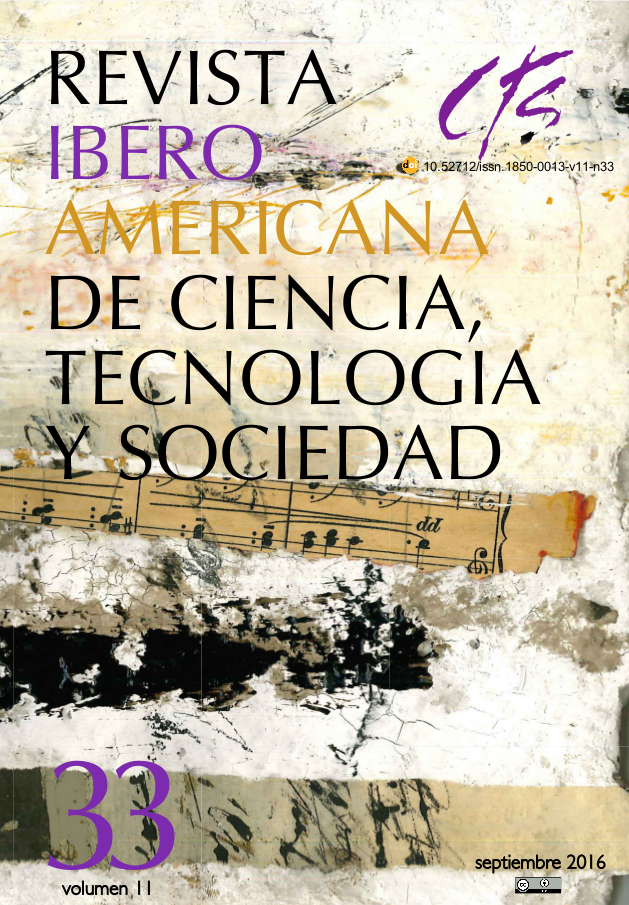Science And Math Education With A STS Orientation: Promoting Critical Thinking
DOI:
https://doi.org/10.52712/issn.1850-0013-451Keywords:
STS orientation, critical thinking, scientific literacy, connections between science and mathematicsAbstract
Modern societies, particularly western ones, are deeply marked by advances in science and technology and their impact in all areas of life. Science education with a STS orientation, aimed at promoting students’ critical thinking and the establishment of connections with other areas such as mathematics, is fundamental to help individuals to make informed decisions and improve their well-being, and their society's well-being as well. In this context, this paper aims to develop science learning activities with a STS orientation, enhancing the promotion of critical thinking and the establishment of connections between science and mathematics. It follows an action- research plan that was considered to be the most viable and coherent one to focus on curriculum issues in action, which in this paper were configured as central to the design, production, implementation and evaluation of learning activities. During their implementation, the data was collected through different techniques and the use of various tools; it was also subjected to a process of content analysis. The results obtained suggest that the activities that were carried out contributed to the mobilization of students’ critical thinking abilities. The theoretical framework that was used seemed to be a significant help to support and explicitly develop learning activities in order to support science teaching practices and improve students’ critical thinking.
Downloads
References
ANDERSON, G. (2000): Fundamentals of educational research, Londres, Falmer Press.
BARDIN, L. (1991): Análise de conteúdo, Lisboa, Edições 70.
BOGDAN, R. e BIKLEN, S. (1994): Investigação qualitativa em educação: uma introdução à teoria e aos métodos, Porto, Porto Editora.
BOSSÉ, M. L., LEE, T. D., SWINSON, M. e FAULCONER, J. (2010): “The NCTM process tandards and the five Es of science: Connecting math and sciences”, School Science and Mathematics, vol. 110, n° 85, pp. 262-276.
COTTRELL, S. (2005): Critical thinking skills, London, Palgrave.
COUTINHO, C. (2011): Metodologia de investigação em ciências sociais e humanas: Teoria e prática, Coimbra, Almedina.
ENNIS, R. H. (1987): “A taxonomy of critical thinking dispositions and abilities”, em J. B. Baron e R. J. Sternberg (eds.): Teaching thinking skills: Theory and practice, Nova York, W. H. Freeman and Company.
ESTEVES, L. (2008): Visão Panorâmica da Investigação-Acção, Porto, Porto Editora.?
HALPERN, D. F. (1996): Thought and knowledge: An introduction to critical thinking, Mahwah, Nova Jersey, Lawrence Erlbaum Associates.
HARLEN, W. (2010): Principles and big ideas of science education, Hatfield, Association for Science Education.
INTERNATIONAL COUNCIL FOR SCIENCE (2011): Report of the ICSU ad-hoc review panel on science, Paris. Em: http://www.icsu.org/publications/reports-and- reviews/external-review-of-icsu.
LATORRE, A. (2003): La investigación-acción - Conocer y cambiar lá práctica educativa, Barcelona, Editorial GRAÓ.
LIN, S.-S. (2014): “Science and non-science undergraduate students’ critical thinking and argumentation performance in reading a science news report”, International Journal of Science and Mathematics Education, vol. 12, pp. 1023–1046.?
MOREIRA, M. A. (2001): A investigação-ação na formação reflexiva do professor estagiário de inglês, Lisboa, Instituto de Inovação Educacional.
NATIONAL COUNCIL OF TEACHERS OF MATHEMATICS (2007): Princípios e Normas para a Matemática Escolar, Lisboa, APM.
NATIONAL ACADEMY OF SCIENCES (1996): National Science Education Standards, Washington, DC, National Academy Press.
NOGUEIRA, S., TENREIRO-VIEIRA, C. e CABRITA, I. (2010): “Propostas didácticas potenciadoras de conexões entre Matemática e Ciências em contextos de educação formal e não formal - contributos do processo de validação”, em J. Matos, A. Domingos, C. Carvalho e P. C. Teixeiral (eds.): Actas do Encontro de Investigação em Educação Matemática (EIEM 2010) “Comunicação no Ensino e na Aprendizagem da Matemática, Costa da Caparica, Faculdade de Ciências e Tecnologia, Universidade de Lisboa, 17-18 de Abril de 2010. ISSN: 2182-0023.
NORRIS, S. e ENNIS, R. H. (1989): Evaluating critical thinking. Pacific Grove, Critical Thinking Press & Software.
OATES, T. (2010): Could do better: Using international comparisons to refine the national curriculum in England. Em: http://www.education.gov.uk/inthenews/inthenews /a0068191/could-do-better- analysis-of-international-curriculums-published.
OSBORNE, J. e DILLON, J. (2008): Science education in Europe: Critical reflections, London, Nuffield Foundation. Em: http://www.nuffieldfoundation.org/sites/default/files/ Sci_Ed_in_Europe_Report_Final.pdf.
ROCARD, M., CSERMELY, P., JORDE, D., LENZEN, D., WALBERG-HENRIKSSON, H. e HEMMO, V. (2007): Science education now: A renewed pedagogy for the future of Europe, Luxembourg, European Commission. Em: http://ec.europa.eu/research/ science-society/document_library/pdf_06/report-rocard-on-science-education_en.pdf.
TENBRINK, T. (1984): Evaluacion: guia practica para profesores, Madrid, Narcea, S. A. de Ediciones.
TENREIRO VIEIRA, C. e VIEIRA, R. M. (2013). Literacia e pensamento crítico: um referencial para a educação em ciências e em matemática. Revista Brasileira de Educação, vol. 18, n° 52, pp. 183-242.
VIEIRA, R. M., TENREIRO-VIEIRA, C. e MARTINS, I. (2011): Educação em ciências com orientação CTS. Porto, Areal Editores.
VIEIRA, R. M. e TENREIRO-VIEIRA, C. (2014): “Fostering Scientific Literacy and Critical Thinking in Elementary Science Education”, International Journal of Science and Mathematics Education, vol. 13, n° 61. Em: http://link.springer.com/article/ 10.1007/s10763-014-9605-2?sa_campaign=email/event/articleAuthor/onlineFirst.
YORE, L. D. (2012): “Science literacy for all—More than a slogan, logo, or rally flag!”, em K. C. D. Tan e M. Kim (eds.): Issues and challenges in science education research: Moving forward, pp. 5–23, Dordrecht, Springer.
YORE, L. D., PIMM, D. e TUAN, H.-L. (2007): “The literacy component of mathematical and scientific literacy”, International Journal of Science and Mathematics Education, vol. 5, pp. 559–589.
Downloads
Published
How to Cite
Issue
Section
License
Copyright (c) 2023 CC Attribution 4.0

This work is licensed under a Creative Commons Attribution 4.0 International License.
All CTS's issues and academic articles are under a CC-BY license.
Since 2007, CTS has provided open and free access to all its contents, including the complete archive of its quarterly edition and the different products presented in its electronic platform. This decision is based on the belief that offering free access to published materials helps to build a greater and better exchange of knowledge.
In turn, for the quarterly edition, CTS allows institutional and thematic repositories, as well as personal web pages, to self-archive articles in their post-print or editorial version, immediately after the publication of the final version of each issue and under the condition that a link to the original source will be incorporated into the self-archive.











